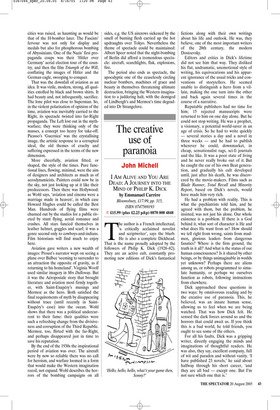The creative use of paranoia
John Michell
I AM ALIVE AND YOU ARE DEAD: A JOURNEY INTO THE MIND OF PHILIP K. DICK by Emmanuel Carrère Bloomsbury, £17.99, pp. 315, ISBN 0747569193 ✆ £15.99 (plus £2.25 p&p) 0870 800 4848 The author is a French intellectual, ‘a critically acclaimed novelist and scriptwriter’, says the blurb. He is also a complete Dickhead. That is the name proudly adopted by the followers of Philip K. Dick (1928–82). They are an active cult, constantly promoting new editions of Dick’s fantastical fictions along with their own writings about his life and outlook. He was, they believe, one of the most important writers of the 20th century, the modern Dostoevsky.
Editors and critics in Dick’s lifetime did not see him that way. They disliked his flat, undramatic, unemotional style of writing, his equivocations and his apparent ignorance of the usual tricks and conventions of storytellers. He seemed unable to distinguish a hero from a villain, making the one turn into the other and back again several times in the course of a narrative.
Reputable publishers had no time for him; 15 rejected manuscripts were returned to him on one day alone. But he could not stop writing. He was a prophet, a visionary, a potential world-saver in an age of crisis. So he had to write quickly — several stories a day and a novel in three weeks — and he had to publish wherever he could, downmarket, in cheap, sensationalist rags, sci-fi journals and the like. It was a poor state of living and he never really broke out of it. But he caught the ear of his own Beat generation, and gradually his cult developed until, just after his death, he was discovered by the movie-makers. Films such as Blade Runner, Total Recall and Minority Report, based on Dick’s novels, would have made him very rich.
He had a problem with reality. This is what the psychiatrists told him, and he agreed with them, but the problem, he insisted, was not just his alone. Our whole existence is a problem. If there is a God behind it, what sort of character is He and what does He want from us? How should we tell right from wrong, saints from madmen, glorious leaders from dangerous fanatics? Where is the firm ground, the truth in it all? And what is the status of our human consciousness? Is it shared by other beings, or by things unimaginable in worlds yet unknown? Perhaps there are aliens among us, or robots programmed to simulate humanity, or perhaps we ourselves function as robots, following instructions from elsewhere.
Dick approached these questions in two ways: by omnivorous reading and by the creative use of paranoia. This, he believed, was an innate human sense, allowing us to feel when we are being watched. That was how Dick felt. He sensed the dark forces around us and the horrors that could await us. If you think this is a bad world, he told friends, you ought to see some of the others.
For all his faults, Dick was a gripping writer, directly engaging the minds and imaginations of thoughtful readers. He was also, they say, excellent company, full of wit and paradox and without vanity. ‘I have published 23 novels,’ he said about halfway through his short career, ‘and they are all bad — except one. But I’m not sure which one that is.’ Carrère never met his subject but he has read all the books and articles about him, and he has acted well and boldly by doing his biography freestyle, from Dick’s own viewpoint as he imagines it. He succeeds in showing why more of us should become Dickheads.
In Dick’s fantasies are many aspects of reality, actual or potential, that are normally hidden. He was a revealer, an initiator, and there is a mythic quality to his end that dignifies his cult. It came suddenly, by a stroke, when he was 54. On the question of his state of mind at that time, the Dickheads are divided. Some say that he was still haunted by his highblown fantasies, others that he died as a Gnostic, quiet and contented in the knowledge of Christ. That was his final enigma.


















































 Previous page
Previous page